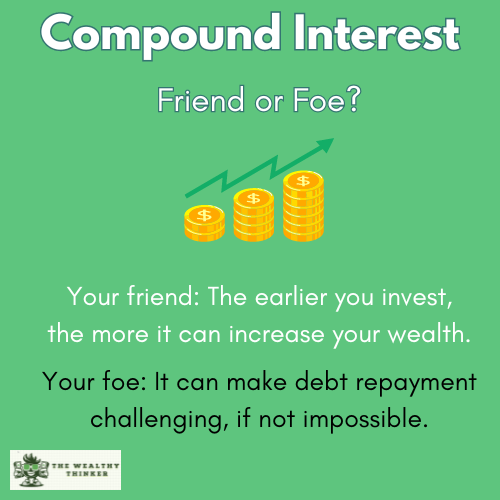Compound interest plays a huge role in our lives, whether we have existing debt or are working on investing our money.
It can make paying off a loan significantly harder or help you become comfortable when you’re ready to retire. But to really understand compound interest, you need to know its power – from the good to the bad.

What is compound interest?
To understand compound interest, key aspects of the definition need to be broken down.
First, compound interest will apply to loans or investments. There is a principal amount (The base amount.) and interest associated with your loan or investment. All of these things have a factor in understanding compound interest.
Principal definition
There is an initial amount that you put down for all loans and investments.
So, for example, if you take out a $10,000 loan, $10,000 is the principal amount.
Interest definition
When you have a loan or investment account, you will have some type of interest. This is where you see interest rates posted for loans and investments.
For a loan, the interest is the additional amount that you owe your borrower for them to make a profit. For an investment account, the interest is the rate of growth/losses that your account will have.
So, if you are borrowing money, the interest rate will be the extra amount added to your principal. If you are investing money, the interest rate will be the extra amount you earn on top of your principal.
Compound interest vs. Simple Interest
Compound interest is the interest on your loan or account based on the principal and accumulated interest.
This is essentially having interest on your interest. Compound interest grows much faster compared to simple interest. Simple interest is the interest on your loan or account based solely on the principal amount.
To really understand compound interest, it’s important to see how it works in real-world scenarios. Especially one good and one bad scenario.
How is compound interest good?
Compound interest can be a powerful tool for investing.
The earlier you start saving, the more money you have to save for a larger portfolio.
Two people can save $2,000 a year at different ages in their life, and the person who started earlier and stopped investing after a few years will have more wealth – all because of compound interest.
Person 1 starts to save $2,000 a year at the age of 21 but stops at the age of 30. He saved $18,000 over nine years into a basic retirement account.
Person 2 only starts to save $2,000 a month at the age of 30 and continues to save this amount until 68 years old. Person 2 saved $76,000 over 38 years in a basic retirement account.
It may seem like Person 2 will have more money saved up for retirement, but it’s actually person 1. It’s helpful to look at the numbers to see why.
Let’s say these two individuals invest in an S&P 500 index fund at a rate of 12%.
Person 1 will have 2.35 million dollars at the age of 68! Person 2 will have 1.3 million dollars, which is still a significant amount of money but less than Person 1. This shows you how investing at a younger age can impact the wealth you can accumulate in your lifetime.
Let’s break down how this is possible. A 26-year-old has $20,000 saved for retirement and will not add any more money to this account.
- At a 12% rate of return from 26 to 68, they could have 3 million dollars for retirement.
- At 27, their account will be at $22,536.
- The following year, it will grow another 12%, to $25,394.
- Each year, that 12% can really add up.
- At the age of 59, their account will be 1 million dollars.
That 12% really compounds the more money you have year after year. In another six years, their account will reach 2 million. It took 33 years to get 1 million in their account, but six years to reach another million.
How is compound interest bad?
Student loan debt is a national crisis.
Many people cannot afford to pay their monthly payments, and trying to pay off their debt seems impossible. A lot of this is due to compound interest.
Let’s use a person’s average student loan debt at $37,000.
- The average interest on student loans is 4.29%
- Your monthly payments on this loan are $381
At this interest rate, after a ten-year standard repayment plan, you will pay over $8,600 in interest on top of the $37,000 original loan. If you pay less than this amount, your overall payments will grow even more, making it harder to pay off your debt.
What happens with compound interest is that you start with $37,000 of debt.
- When you make your first $381 payment, your total is now $36,619.
- Each month you will then have additional interest on your loan, making the total you owe your principal $36,619 and the interest $130 for a total of $36,749.
- You pay your monthly payment of $381, bringing your total to $36,368 – $130 towards the interest and $251 towards your principal.
- Then this starts over again.
- You’ll add an additional $130 of interest to your total amount owed and pay off $381 that month.
- Your interest is calculated off on your principal and previous interest.
If you did a lower payment plan, you’d see the impact of compound interest, making it more challenging to see your principal amount go down.
For example, if you’re paying $100 a month towards your loan, you would still have $30 left towards the interest that was not paid. That total will be added to the principal, and the interest for the next month will be calculated on top of that.
If this were simple interest, the interest would only be calculated on your principal amount and none of the interest that is accrued. So you won’t avoid interest, but the interest will not be as much.
To combat the negative aspect of compound interest on debt, try to make extra payments to reduce your principal and overall interest. Starting this early can help make paying off debt a lot more manageable.
Final thoughts on How Compound Interest Works
Compound interest can be a friend and an enemy.
It can help you while you’re young by increasing your wealth, but it can also make debt payments challenging and almost impossible. Aiming to pay off debt as early as possible can help make debt repayment more manageable.
Try to invest today instead of tomorrow to add more time to the growth of your investments.


















